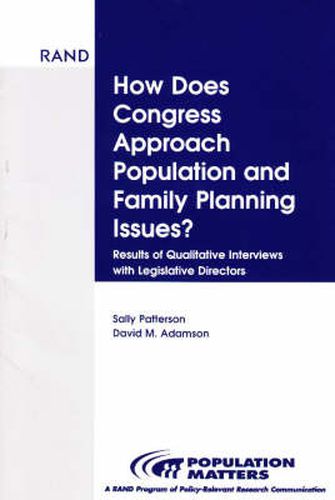Readings Newsletter
Become a Readings Member to make your shopping experience even easier.
Sign in or sign up for free!
You’re not far away from qualifying for FREE standard shipping within Australia
You’ve qualified for FREE standard shipping within Australia
The cart is loading…






Congressional opinions on issues related to population are highly polarized. Approximately 90 percent of Congress consistently votes either uniformly to support or uniformly to oppose population-related legislation–so the remaining 10 percent is likely to determine the fate of such initiatives. To determine how this critical group makes its decisions, researchers interviewed a sample of legislative directors (chosen as proxies, to allow in-depth interviews). Most respondents felt that the United States should continue to play a leading role internationally, but several also stressed that their members of Congress favor increased emphasis on multilateral approaches. A majority felt that world population growth is a problem but is not urgent. Nearly unanimous support was expressed for U.S. support of voluntary family planning when it is understood to exclude abortion. Congress would benefit from research-based, factual information on a variety of international population issues.
$9.00 standard shipping within Australia
FREE standard shipping within Australia for orders over $100.00
Express & International shipping calculated at checkout
Congressional opinions on issues related to population are highly polarized. Approximately 90 percent of Congress consistently votes either uniformly to support or uniformly to oppose population-related legislation–so the remaining 10 percent is likely to determine the fate of such initiatives. To determine how this critical group makes its decisions, researchers interviewed a sample of legislative directors (chosen as proxies, to allow in-depth interviews). Most respondents felt that the United States should continue to play a leading role internationally, but several also stressed that their members of Congress favor increased emphasis on multilateral approaches. A majority felt that world population growth is a problem but is not urgent. Nearly unanimous support was expressed for U.S. support of voluntary family planning when it is understood to exclude abortion. Congress would benefit from research-based, factual information on a variety of international population issues.